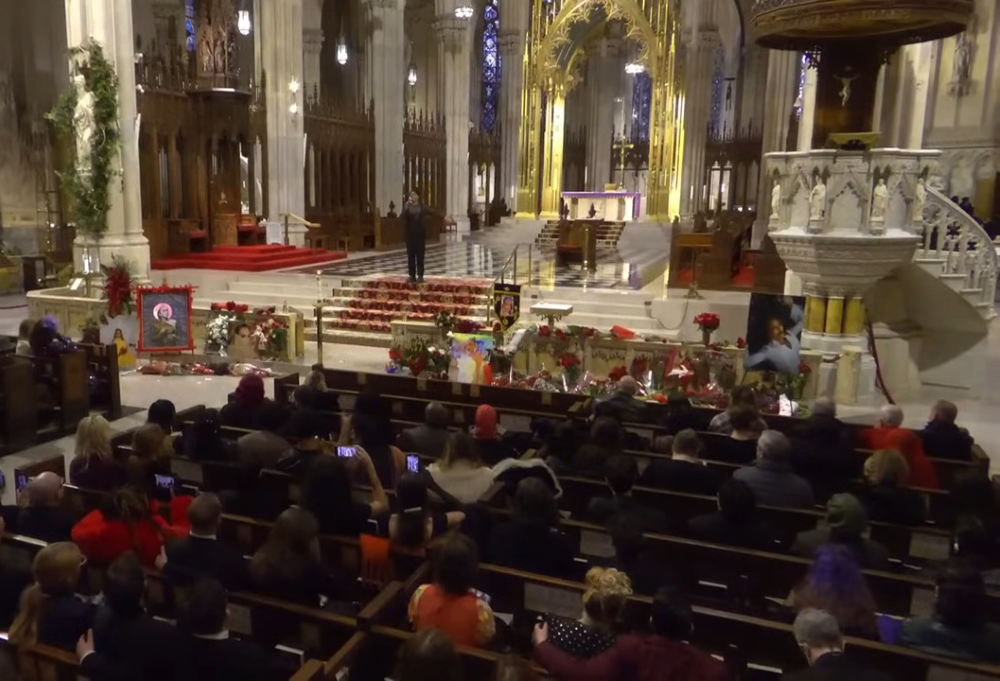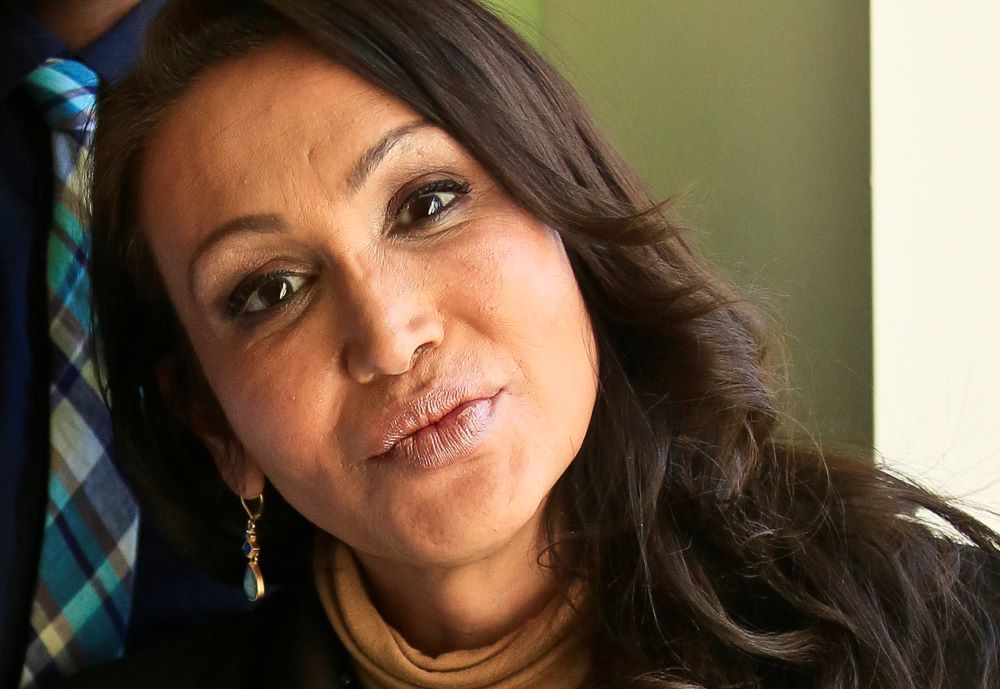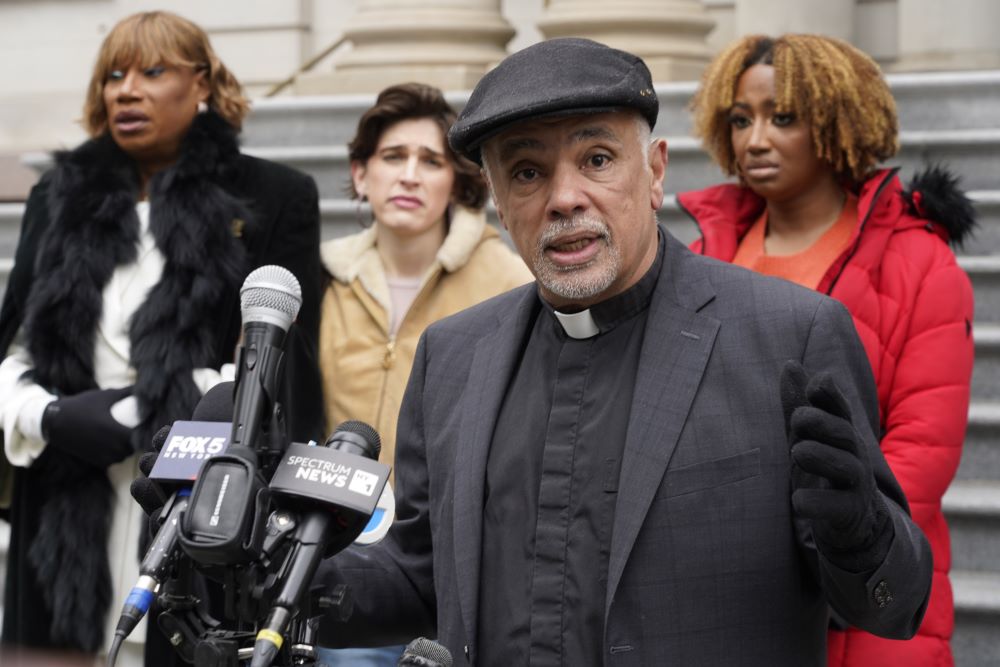
Actor and director Billy Porter sings "Give Us This Day" to a packed St. Patrick's Cathedral in New York City as friends and family gathered to honor the life of LGBTQIA+ activist Cecilia Gentili on Feb. 15." A picture of Gentili sits in front of the altar, where mourners left bouquets in her memory. (NCR screenshot/YouTube)
On Feb. 15 more than 1,000 mourners — predominantly LGBTQIA+ people of color — gathered for the funeral of Argentine American activist Cecilia Gentili at St. Patrick’s Cathedral in New York City. Gentili was a transgender woman of color who advocated for the health and dignity of sex workers and LGBTQIA+ people. She was also a baptized Catholic and therefore entitled to a Catholic funeral, a corporal work of mercy.
Gentili was born in Argentina and, after surviving a childhood of sexual abuse, immigrated to the United States where she was "undocumented, homeless and trafficked for prostitution in the U.S., [and] she also had a heroin addiction," The New York Times wrote in an obituary. In spite of these hardships, Gentili went on to assume leadership roles in nonprofits, providing health care for trans people and AIDS patients and advocating for the decriminalization of sex work. Gentili exhibited a life of joy, love and radical acceptance.

Transgender activist Cecilia Gentili poses for a photo at the offices of the Oxford University Press in New York on April 24, 2014. She died on Feb. 6 at age 52.(AP photo/Bebeto Matthews, file)
However, the funeral garnered criticism and condemnation from a number of Catholic media outlets and figures, including the New York Archdiocese. It is regrettable, to say the least, that many Catholics have chosen to react in anger, assuming that because Gentili had identified as an atheist, the Catholic funeral was a mockery of the faith. But in a November 2023 interview Gentili had said, "I have been reexamining my relationship with religion for a long time," and articulated her renewed intention to attend church on Sundays with her partner.
Detractors have called her funeral "indecent" and "revolting," labeling those in attendance "rank anti-Catholic bigots." The pastor of the cathedral, Fr. Enrique Salvo, responded to the public outcry with a formal statement, calling the funeral "scandalous" and "sacrilegious." Others have expressed concern that the event may have further harmed trans people’s reputation with the Catholic Church. But the livestream of the funeral service reveals a liturgy of joy rooted in Christian values of charity, human dignity and hope of everlasting life.
Before the funeral rite began, Black actor and singer Billy Porter delivered a powerful performance of the Gospel hymn "This Day," a rendition of the Our Father prayer. Catholic Vote tweeted that Porter’s performance was "mocking the Our Father prayer" and called it "unbelievable and sick." Such a response belies cultural ignorance. The song was written by Edwin Hawkins, a legend of Gospel music. The lyrics emphasize gratitude for God’s love, provision and grace.
It is as if we queer folks are damned if we do, damned if we don’t.
One of the most controversial moments occurred when eulogists Liaam Winslet and Oscar Diaz addressing the deceased as, "esta puta, esta gran puta, la santa Cecilia, la madre de todas de las putas," that is, "this whore, this great whore, saint Cecila, the mother of all whores." Such language is understandably shocking to many sensibilities, but context matters.
Within Gentili's community, the word "whore" is a reclamation of a slur used with affection, much like the word "queer" itself. Organizer Fran Tirado said that if Gentili called you a whore, this was her highest compliment. Here, a word once used for shame is used to honor a motherly heroine. This esteem was also on display the moment a woman of color exclaimed "Ave Cecilia!" during the cantor’s rendition of "Ave Maria" and danced down the aisle, also prompting conservative ire. But "ave" is a greeting akin "O Cecilia" or "Dear Cecilia." More importantly, that someone saw the likeness of Mary, mother of compassion, in Gentili should make us hopeful.
Some have criticized the funeral for being "raucous." Even Fr. James Martin, known for his advocacy for LGBTQIA+ Catholics, commented that when in any sacred place "I feel that you should always err on the side of respect and prudence." But by what standards are we deciding those terms? After all, behavior that is considered respectful varies with culture and judgment can be a racial microaggression. While white Catholics may find clapping, shouting and other spontaneous participation disrespectful, these expressions are part of the worship styles of many Black and Indigenous congregations. For marginalized peoples, such effusive joy is also a refusal to make oneself small for the comfort of the dominant culture.

Senior Pastor Samuel Cruz of Trinity Lutheran Church in Brooklyn, N.Y., speaks at a news conference on Feb. 21. LGBTQ+ activists and advocates organized the news conference to demand an apology from the Archdiocese of New York for cutting short the Feb. 15 funeral service for Cecilia Gentili. (OSV News photo/Gregory A. Shemitz)
Too often, LGBTQIA+ people are assumed to be areligious at best and antagonistic to religion at worst. But in the case of this funeral Mass, when such individuals participated in and helped lead a liturgy, many responded with prejudice. It is as if we queer folks are damned if we do, damned if we don’t. Such a reaction feels hateful to us, and certainly seems to indicate a refusal to listen or recognize bids for reconciliation. To those of us who were looking for it, the fruit of the Spirit abounded in Gentili's funeral: love, joy, peace, kindness, goodness and faithfulness were expressed beautifully through music, readings, solidarity and words of remembrance.
The response of the New York Archdiocese and others reflects a poverty of imagination regarding how the church might integrate queer culture and symbolism within a Catholic liturgy in a way that holds sacred both tradition and LGBTQIA+ dignity.
Advertisement
"I just never had opportunities to experience a faith that was fully embracing of me," Cecilia Gentili said at the end of her life, "so I came to identify as an atheist, but I know that so many trans people have been able to find a relationship with faith in spaces that include them."
The community who gathered at St. Patrick's on Feb. 15 did so in hopes that the cathedral might be such a space. It would be wise for Catholics to practice forbearance and walk alongside LGBTQIA+ folks, seeking a way to worship together. And it would be holy if all Catholics sought to imagine what might be the charisms of queer culture and spirituality, not just for queer people but for the whole church.






